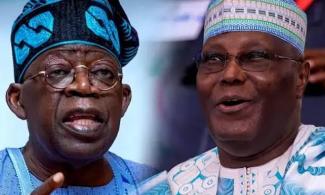
The US court on Friday in a notification of docket entry stated that “it will not consider any third-party or ex parte submissions.”
The United States District Court in the Northern District of Illinois has stated that it has received “extensive email communications” from many third parties in relation to the case brought y Nigerian former Vice President, Atiku Abubakar, concerning President Bola Tinubu’s Chicago State University records.
The US court on Friday in a notification of docket entry stated that “it will not consider any third-party or ex parte submissions.”
“The court understands the significant public interest in this dispute, but the court will not consider any third-party or ex-parte submissions. Rather, the court’s review will be limited to the parties’ briefing and the official records on the docket,” the court notification said.
SaharaReporters had during the week reported that Atiku filed a fresh motion urging the US Court to overrule Tinubu’s request to stop Chicago State University from releasing his (Tinubu’s) academic record.
Atiku had earlier secured an order from a US magistrate for CSU to make Tinubu’s academic records available to his legal team.
The magistrate, Jeffrey Gilbert, had last week ordered Tinubu’s alma mater to provide all relevant and non-privileged documents to Atiku’s legal team within two days.
Atiku is currently challenging Tinubu’s emergence as the winner of the February 25 presidential election.
The matter is currently before the Supreme Court in Nigeria.
The documents sought by the PDP candidate, through his counsel, Angela Liu, include Tinubu’s record of admission and acceptance at the Chicago State University, dates of attendance as well the degrees, awards, and honours obtained by Tinubu from the CSU.
But as the deadline given by the magistrate drew nearer, Tinubu’s lawyers approached the US high court, arguing that the earlier decision by the magistrate needed to be reviewed by a district judge.
The request for a review and delay of the magistrate’s order till Monday was eventually granted by the US district judge.
Tinubu’s application, filed by his New York-based lawyer, Oluwole Afolabi, advanced two reasons.
First is that his academic records in issue are not useful in Nigerian courts as claimed by Atiku because “the Nigerian election proceedings and the Nigerian courts have explicitly been unreceptive to the discovery.”
His second reason is that Atiku’s request “is unduly intrusive because it allows the applicant (Atiku) to conduct a fishing expedition into the intervenor’s private, confidential, and protected educational records.”
But Atiku, in a fresh response filed on Wednesday, in Chicago, Illinois, urged the court to overrule Tinubu’s request in its entirety.
Atiku’s counsel, Angela Liu, appealed that “If the court overrules the objections, the applicant respectfully requests that it enter an order requiring production of documents no later than October 2, 2023, and the deposition scheduled no later than October 3, to allow time for transcripts to be finalised, and the discovery obtained to be sent to Nigeria (which is six hours ahead) by October 4, so that such evidence may, in turn, be filed with the Supreme Court by October 5, which is when applicant’s Nigerian counsel intend to submit any new evidence to the Supreme Court.”
Atiku’s lawyer explained that contrary to Tinubu’s “inflated rhetoric”, he is not seeking “to conduct a fishing expedition into Tinubu’s private, confidential, and protected educational records.”